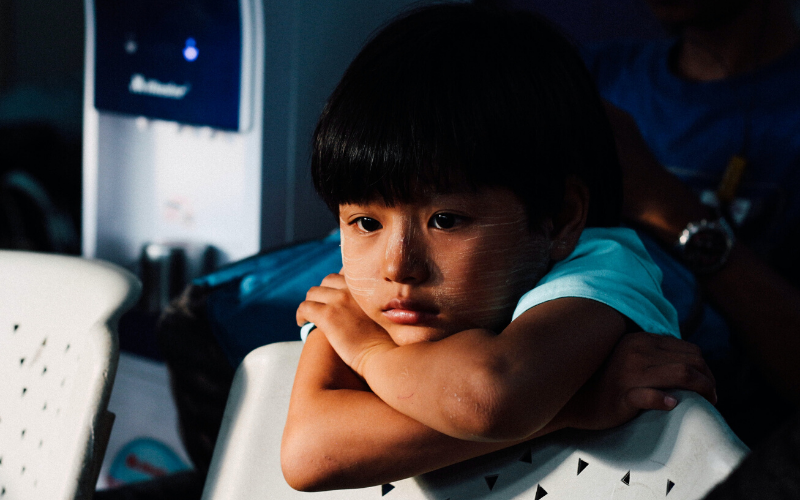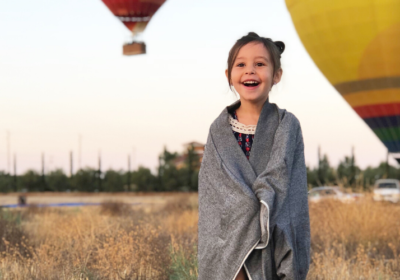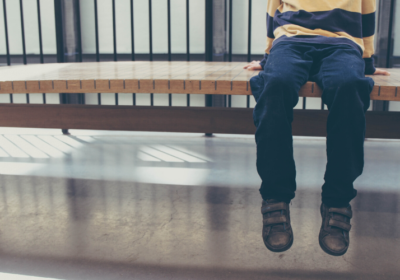Adoption Loss
“Did you know that hearts are stretchy and both of your Mommies fit in your heart?”
She shook her head somberly. I went on to explain that just like her Mommy and Daddy could stretch out their hearts for each new brother or sister who joined the family, she could stretch out her heart for her first Mommy. Everyone who is a part of you can fit into your heart.
Children under the age of 11 have a hard time thinking in gray areas. The sweet little girl mentioned above really believed that she had to choose one parent to love and the other parent to reject. She believed that it would hurt her Mommy’s feelings to be seen as one of two mommies.
This view has multiple pitfalls. This child looks in the mirror and sees that she doesn’t look like her Mommy. In rejecting her birth mother, the self-loathing begins. “I wish I didn’t have curly hair.” “I wish I had blue eyes.” “I hate my brown skin.” You see, children internalize both sets of parents, whether or not they have any explicit memories about their birth parents. The meaning they make about their birth parents is incredibly important to how they view themselves.
The messages parents send are both verbal and nonverbal. I believe what is not said is often more impactful than what is said. Your children are thinking about their birth parents. It is a big responsibility for a child to have to bring that up to you.
What If I Don’t Have Any Answers?
There is nothing more annoying than sharing something that you feel really vulnerable about with someone and having them try to “fix it”, rather than just sitting with you in that heart-broken space. You don’t have to have any answers to sit with your child in that heart-broken space. You don’t have to have any answers to cry with them and wonder out loud together what her/his birth mom or dad might have been like.
My daughter once asked me, “Can you imagine what it would have been like if you never even got to know Grandma (my Mom)?” “Can you imagine what you would have missed?” I couldn’t. I really couldn’t imagine that.
Am I Opening a Can of Worms?
Some children aren’t in a place where they are very interested in talking about their adoption. I view curiosity as a sign of regulation. Children who are in a dysregulated state are not curious. Of course, there are children who just are not interested, but I would say this makes up a small minority. Usually disinterest is a sign of insecurity or dysregulation. As a general rule, I think it is important to often invite conversations about birth parents and adoption.
What If That Is All My Child Wants To Talk About?
Occasionally, I see a child who is in a “stuck” place. They can’t stop thinking about their adoption, and they feel sadness and loss constantly. Often this started after watching an adoption-themed movie or when the child is struggling socially. Even when the child is in this “stuck” place, I recommend devoting some time with purpose to helping the child understand his/her story. Work on a lifebook together, create a timeline together, pay attention to the hurt, and it will ease.
I had one client I worked with that took her daughter to the hospital where she was born. They took a tour of the prenatal ward and went shopping for some baby clothes that her birth mom would have loved for her to have worn if she had had her as a newborn. Before this, Mom had been trying to pull her out of her sadness. As soon as she stepped into that sadness with her and devoted some time to exploring it, the sadness eased. Parents are afraid that if they step into that sadness, it will consume their child. It is just too big of a loss for a child to deal with on her/his own.
Acknowledge That Your Child’s Life Did Not Begin With Adoption
“She looks just like you,” the woman at the park said. My heart swelled with pride as I met my daughter’s eyes and smiled. Then we both noticed that she was looking at my niece, not at my daughter, when she said that. My heart jumped. Of course, she wasn’t talking about my daughter. My heart sees her as completely mine. It took my brain a minute to catch up. We are different ethnicities, and we look nothing alike physically. We moved on, but the moment was captured by her, and it needed to be addressed. We talked about it later, privately. I brought it up. If I feel sadness that others don’t see us and make an immediate connection, then I know she does also. If we don’t discuss these moments with our kids, then they have to deal with that sadness all alone.
Listen To Adult Adoptees
“I don’t like the book you recommended that I read. The author is just one of those people who is always going to see the world as half-empty,” said the dad I was talking to about a book written by an adult adoptee. The book is complicated, yes, but adoption is complicated. The memoir is also full of grief, redemption, hope, and loss. Black Hands White Hands: A View From the Crib by Jaiya John is one of my favorite memoirs. I recommend that parents who have adopted really take the time to listen to adult adoptees. Sit down over a cup of coffee and ask them what they needed that they didn’t get. Join adoption groups with adult adoptees making up a good percentage of the group and listen without getting defensive. You will start to see themes of loss. You will start to look at your child as someone with a history and a past that has nothing to do with you. You will be encouraged that your children will always be yours.


